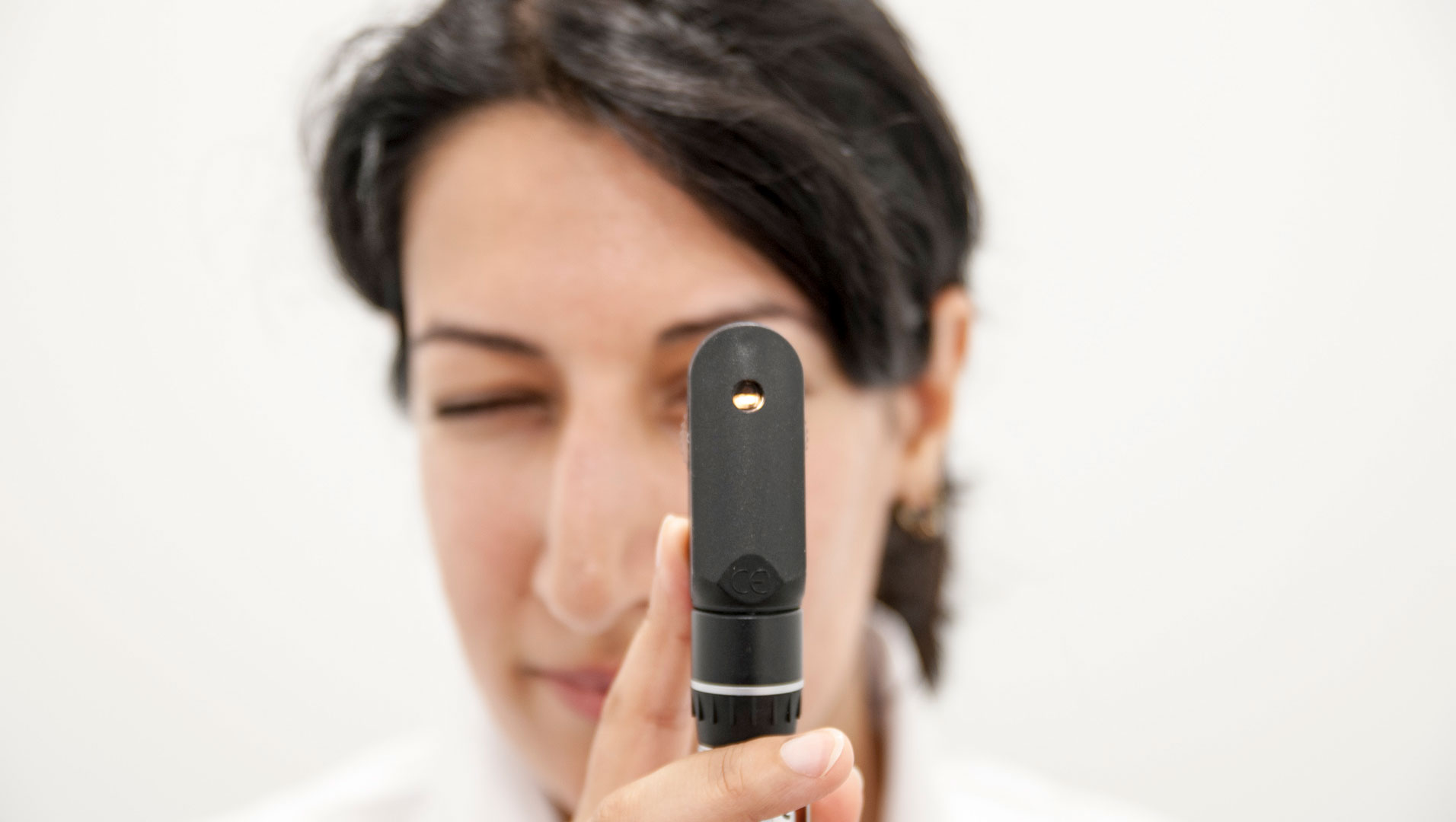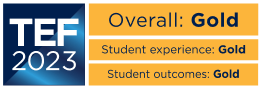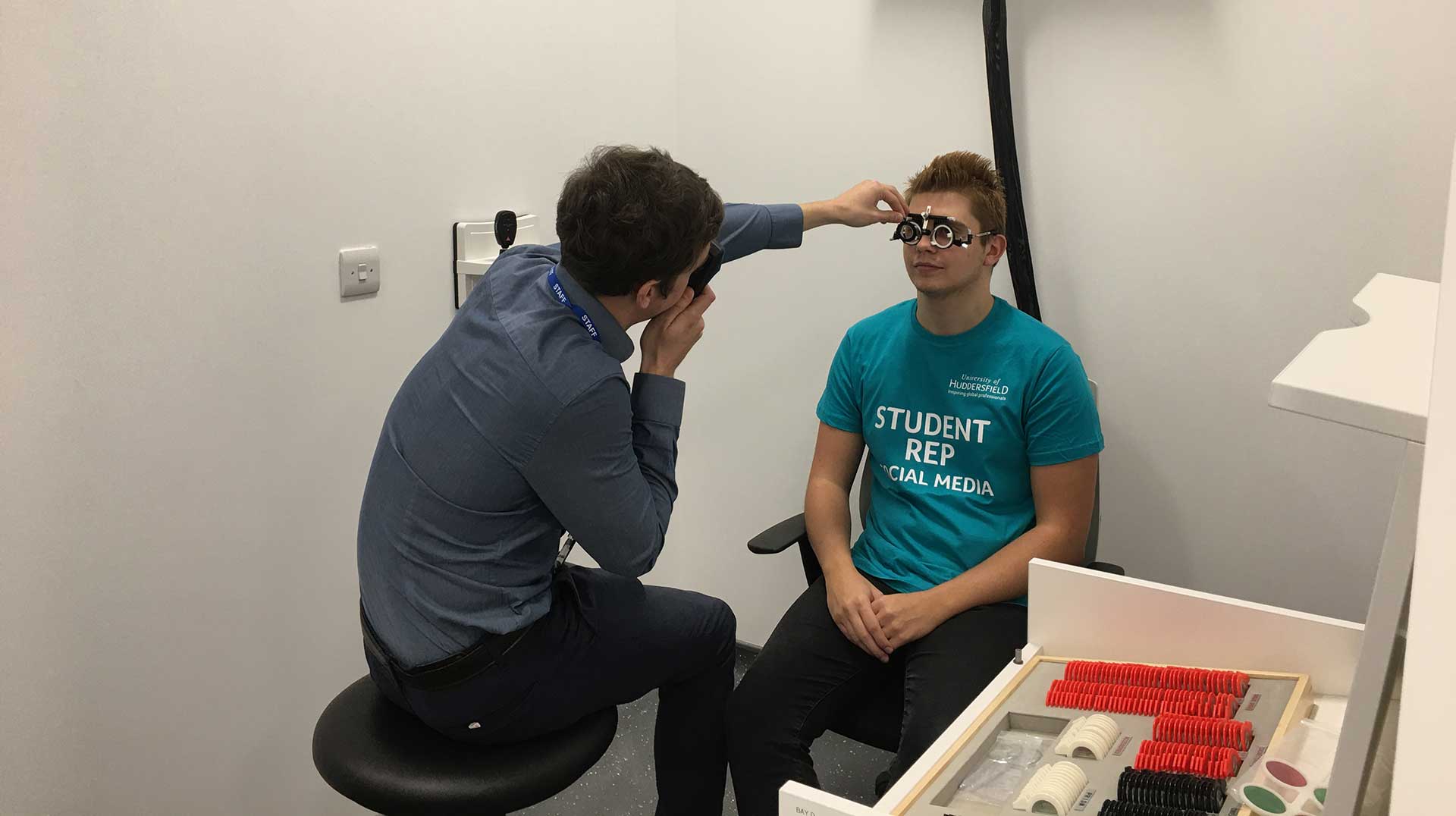
Optometry header image
Optometry MOptom
Start Dates
21 September 2026
Duration
4 years full-time
Overview
Why choose Huddersfield for this course?
- You’ll learn about the science of the eye and the integral principles in optometry and vision sciences.
- You’ll take part in placements in local hospital eye departments alongside NHS colleagues.
- Graduate ready for careers in hospital or private optometry, research, or the wider optical industry.
Accreditation and Professional Links
Recognised connections to give you an extra edge when you graduate. Read More
Becoming an optometrist means you make an impact in the lives of the patients you treat every day. From performing eye exams to treating all sorts of vision-related problems, optometry is a rewarding healthcare professional career path – and it all starts with a well-rounded education.
The Optometry MOptom degree aims to give you the knowledge and practical skills to kickstart your career in optometry. To support you as you study this course, we've a brand new optometry laboratory and a joint venture eye clinic where the emphasis is on learning clinical skills from the first year. In your first year you’ll be introduced to fundamental clinical techniques that will be the base for developing required optometric skills.
Why study Optometry MOptom
This course is approved by the General Optical Council and is fully aligned with the new outcomes for optometry. In your third year you’ll be able to see patients at our joint venture eye clinic, University Valli Opticians, right here on campus.
In the final year of the MOptom, in collaboration with the College of Optometrists, you’ll be offered a placement working in practice. There you’ll develop your skills to enable you to graduate with the MOptom and register directly with the General Optical Council as an optometrist.
Career opportunities after the course *
Optometrists
Optical Dispensers
Optician Technicians
Opticians/Optometric Assistant
Optical Laboratory Technicians
*Lightcast
Entry Requirements
AAB-ABB at A Level, which must include 3 A-level subjects. Two A levels at grade AB must be in Science subjects (Mathematics, Physics, Biology or Chemistry) and a third A level at grade B can be in any subject, excluding General Studies. The endorsement for practical work is an essential part of Science A Level study and is a requirement for entry to the MOptom course.
DDM in BTEC Level 3 Extended Diploma in Applied Science combined with a Science A Level in Mathematics, Physics, Biology or Chemistry, minimum grade B. Or DDM in BTEC Level 3 Extended Diploma in Health and Social Care combined with a Science A Level in Mathematics, Physics, Biology or Chemistry, minimum grade B. The endorsement for practical work is an essential part of Science A Level study, and is a requirement for entry to our degree course. Applicants undertaking a BTEC without an additional A Level may be considered for the Science Extended Degree leading to a BSc(Hons) Degree entry route.
In addition, you must have 5 GCSEs at grade 4/C including Maths and English. For applicants not taking A levels, this must also include GCSE Chemistry and Biology or GCSE Double Award Science/Double Science/Combined Science.
An offer will be influenced by the subjects you are studying, your personal statement and your predicted grades.
Applicants who have taken a single resit in an A level subject will be considered, with the higher of the two grades taken into account. Additional resits (i.e. a third attempt or beyond) will not be accepted.
The Access to Higher Education Diploma is not accepted for entry onto this course. You may wish to consider the Science Extended Degree as explained below.
Foundation Years from other Universities are not considered for entry onto this course.
T Levels will be judged on an individual basis but are required to be in the Healthcare Science area with an occupational specialism in Optical Care Services. GCSE subjects and grades will be considered in addition to the T Level. An additional A Level at a minimum of grade B in one of the following science subjects, Mathematics, Physics, Biology or Chemistry is also required.
If you do not have the appropriate qualifications for direct entry onto the Optometry BSc(Hons), you may be able to apply to our Science Extended Degree (BCF0). Progression onto Optometry is dependent on meeting stringent performance levels in the Science Extended Degree. You must pass all modules with an overall pass mark of at least 70 per cent. Plus at least 70 per cent in the Chemistry module and 70 per cent in the Maths and Physics module. You may also undertake an interview with the Optometry admissions staff.
Additional Information
Alternatively, a First degree in a relevant Science subject (Orthoptics, Ophthalmic Dispensing, Biochemistry, Chemistry, Biomedical Science, Pharmacology, Mathematics, Physics) at a minimum grade of Upper Second (2:1) with a minimum overall grade of 65%.
Alternatively, a Masters degree in a relevant Science subject (Orthoptics, Ophthalmic Dispensing, Biochemistry, Chemistry, Biomedical Science, Pharmacology, Mathematics, Physics) at a minimum grade of Merit.
If you are a registered Dispensing Optician wishing to apply you must have met the ABDO qualification (or equivalent) at 65% or better and have obtained a higher specialist certificate either in low vision or contact lens practice. For those with a contact lens specialism they must also be a registered contact lens optician. Proof of registration with the General Optical Council is also required.
Other suitable qualifications or experience may be considered. Please contact the Student Recruitment and Admissions Team at study@hud.ac.uk.
Completion of any part or the entirety of similar prior studies does not qualify for entry into Year 1.
Entry and transfer onto Year 2, 3 or 4 of the course is not permitted.
You need a satisfactory enhanced Disclosure and Barring Service (DBS) prior to registration on the course. We arrange this as part of the application process. The University will pay for the full DBS check, you are not required to pay for this. You'll be required to sign a self-declaration at the start of each year and at the end of the course. All police contact during the course must be reported to the course leader as a matter of urgency and may lead to suspension or termination of your registration. This may also be required to be reported to the General Optical Council (GOC). We will request an Overseas Police Check if you have lived in a country outside of the UK for 6 months or more (whether continuously or in total) in the last 10 years before applying to us and whilst aged 18 or over.
Please note that placement providers for this course may require you to have received a number of vaccinations, unless medically exempt, and provide evidence of these. As a student on a course with a clinical or healthcare placement, we strongly recommend that you complete any courses of vaccinations required under current guidelines for your future profession. Failure to do so may result in your inability to undertake a placement in certain clinical settings, therefore impacting upon your academic progression, and may result in academic failure of your course.
If your first language is not English, you will need to meet the minimum requirements of an English Language qualification. The minimum for IELTS is 7.0 overall with no element lower than 6.5, or equivalent. Read more about the University’s entry requirements for students outside of the UK on our International Entry Requirements page. If you have alternative qualifications or do not meet the IELTS requirement we also offer a range of Pre-Sessional English Programmes.
For further information please see the University's minimum entry requirements.
Course Details
This final year is a work-based placement year comprising 30 hours per week for 44 weeks. (Hours could be subject to change).
Teaching and Assessment
Discover what to expect from your tutor contact time, assessment methods, and feedback process.
Global Professional Award
At Huddersfield, you’ll study the award-winning Global Professional Award (GPA) alongside your degree* — so you’re ready for the career you want, whatever subject you choose.
Placements
On our Optometry MOptom course you will benefit from attending a placement during your final year. The placement provides real-world experience and gives you the opportunity to work with other professional colleagues. Placements will be awarded on an application basis administrated by The College of Optometrists. Placements can be nationwide and we cannot guarantee a location. The final year placement may come with relocation costs, rental in the location and transport to the placement for the period (a minimum of 44 weeks). This is a paid placement, of 30 hours per week.
This Optometry MOptom is a new course, however previous students from the Optometry BSc(Hons) course have undertaken placements with Specsavers, Boots Opticians, Vision Express among others.
Your Career
Optometry is a regulated profession requiring registration with and adherence to the General Optical Council registration requirements. Registration will require completing the placement.
You can find out more about careers in Optometry on the College of Optometrists website and registration requirements from the General Optical Council.
As a graduate of this course you may work in corporate optometry, in private independent practice, where you could start your own business, in hospital optometry working with other ophthalmic colleagues, in consultancy, and professional affairs roles, training up optometrists in new equipment, medical devices and medications/supplements or in research and teaching.
This Optometry MOptom is a new course and therefore no graduates as yet, however previous graduates from the Optometry BSc(Hons) course have gone on to work in roles such as resident optometrists at Boots Opticians, Vision Express, and SpecSavers.
88%
88% of students from this subject area were in work or further study within 15 months after graduating.
* HESA Graduate Outcomes 2022/23, UK Domiciled
94%
94% of participants agreed that academic support was of high quality in this subject area.
* National Student Survey (NSS), 2025
Fees and Finance
This information is for Home students applying to study at the University of Huddersfield in the academic year 2026/27.
Please note that tuition fees for subsequent years may rise in line with inflation (RPI-X) and/or Government policy.
From January 2027 the UK government is launching a new student funding system for people starting university education. Read more about the Lifelong Learning Entitlement (LLE).
For detailed information please visit https://www.hud.ac.uk/study/fees/
This information is for international students applying to study at the University of Huddersfield in the academic year 2026/27.
Please note that tuition fees for subsequent years may rise in line with inflation (RPI-X) and/or Government policy.
For detailed information please visit https://www.hud.ac.uk/international/fees-and-funding/
As a student of Optometry you are required to obtain and maintain registration with the General Optical Council throughout your studies. Current fees for 2024/25 are £30.
You'll also be required to attend brief periods (covering 12 hours) of hospital placements in your third year. It is anticipated that the placements will take place in local eye departments. Community vision screenings may also be offered requiring attendance in the local community. Costs associated with travel to these placements are the responsibility of the student and will vary depending on the mode of transport but should not exceed £75 in total. The final year placement can be anywhere in the country; this may come with relocation costs, rental in the location and transport to the placement for the period (a minimum of 44 weeks). This is a paid placement, of 30 hours per week.
Most of the equipment required for the course will be provided. You will be issued with one tunic and one name badge, additional or lost tunics or name badges will be paid for at your own cost (approximately £10 per item). You will be required to purchase small items of equipment including a PD ruler and facial ruler. The cost of these items will be around £50. Although we will supply them for use in the clinic, you may find it beneficial to purchase your own small items of equipment, including ophthalmoscope and retinoscope sets. These can cost up to £2000 and will be required for future practice.
You need satisfactory enhanced Disclosure and Barring Service (DBS) prior to registration on the course. We arrange this as part of the application process. The University will pay for the full DBS check, you are not required to pay for this. You'll be required to sign a self-declaration at the start of each year and at the end of the course. All police contact during the course must be reported to the course leader as a matter of urgency and may lead to suspension or termination of your registration. This may also be required to be reported to the
Scholarships and Bursaries
Discover what additional help you may be eligible for to support your University studies.
Tuition Fee Loans
Find out more about tuition fee loans available to eligible undergraduate students.
What’s included in your fee?
We want you to understand exactly what your fees will cover and what additional costs you may need to budget for when you decide to become a student with us.
If you have any questions about Fees and Finance, please email the Student Finance Team.
Gallery
See below for a glimpse at some of our facilities.
Explore More
Why Hud
Explore the unique opportunities and resources that make our institution a top choice for students seeking a well-rounded and future-focused education.
More Info
Careers support
We know you’re coming to university to study on your chosen subject, meet new people and broaden your horizons. However, we also help you to focus on life after you have graduated to ensure that your hard work pays off and you achieve your ambition.
Find out more about careers supportStudent support
At the University of Huddersfield, you’ll find support networks and services to help you get ahead in your studies and social life. Whether you study at undergraduate or postgraduate level, you’ll soon discover that you’re never far away from our dedicated staff and resources to help you to navigate through your personal student journey.
See our support servicesTeaching Excellence
Great teaching is engaging and inspiring — it helps you reach your full potential and prepares you for the future. We don’t just teach well — we excel — and we have the awards and recognition to prove it.
Find out moreInspiring Academics
Our researchers carry out world-leading work that makes a real difference to people’s lives. Staff within the Department of Physical and Life Sciences may teach you on this course.
Find out more about our staffResearch Excellence
You’ll be taught by staff who want to support your learning and share the latest knowledge and research.
Find out moreAccommodation
Looking for student accommodation? Huddersfield has you covered. HudLets has a variety of accommodation types to choose from, no matter what your preference. HudLets is the University’s approved accommodation service, run by Huddersfield Students’ Union.
Take a look at your optionsFurther Study
If you want to continue your learning beyond your undergraduate degree, there is a range of financial support available for postgraduate study, including discounts for Huddersfield graduates.
Discover postgraduate coursesLegal information
When you enrol as a student of the University, your study and time with us will be governed by our terms and conditions, Handbook of Regulations and associated policies. It is important that you familiarise yourself with these as you will be asked to agree to them when you join us as a student. You will find a guide to the key terms here, along with the Student Protection Plan.
Although we always try and ensure we deliver our courses as described, sometimes we may have to make changes for the following reasons:
Changes to a course you have applied for but are not yet enrolled on
If we propose to make a major change to a course that you are holding an offer for, then we will tell you as soon as possible so that you can decide whether to withdraw your application prior to enrolment. We may occasionally have to withdraw a course you have applied for or combine your programme with another programme if we consider this reasonably necessary to ensure a good student experience, for example if there are not enough applicants. Where this is the case we will notify you as soon as reasonably possible and if you are unhappy with the change we will discuss with you other suitable courses we can transfer your application to. If you do not wish to transfer to another course with us, you may cancel your application and we will refund you any deposits or fees you have paid to us.
Changes to your course after you enrol as a student
Changes to option modules
Where your course allows you to choose modules from a range of options, we will review these each year and change them to reflect the expertise of our staff, current trends in research and as a result of student feedback or demand for certain modules. We will always ensure that you have an equivalent range of options to that advertised for the course. We will let you know in good time the options available for you to choose for the following year.
Major changes
We will only make major changes to non-optional modules on a course if it is necessary for us to do so and provided such changes are reasonable. A major change is a change that substantially changes the outcomes, or a significant part of your course, such as the nature of the award or a substantial change to module content, teaching days (part time provision), type of delivery or assessment of the core curriculum. For example, it may be necessary to make a major change to reflect changes in the law or the requirements of the University’s regulators or a commissioning or accrediting body. We may also make changes to improve the course in response to student, examiners’ or other course evaluators’ feedback or to ensure you are being taught current best practice. Major changes may also be necessary because of circumstances outside our reasonable control, such as a key member of staff being unable to teach due to illness, where they have a particular specialism that can’t be adequately covered by other members of staff; or due to pandemics, other disasters (such as fire, flood or war) or changes made by the government.
Major changes would usually be made with effect from the next academic year, but may happen sooner in an emergency. We will notify you as soon as possible should we need to make a major change and will consult with affected groups of students and any changes would only be made in accordance with our regulations. If you reasonably believe that the proposed change will cause you detriment or hardship we will, if appropriate, work with you to try to reduce the adverse effect on you or find an appropriate solution. Where an appropriate solution cannot be found and you let us know before the change takes effect you can cancel your registration and withdraw from the University without liability to the University for any additional tuition fees. We will provide reasonable support to assist you with transferring to another university if you wish to do so and you may be eligible for an exit award depending on how far through your course you are.
In exceptional circumstances, we may, for reasons outside of our control, be forced to discontinue or suspend your course. Where this is the case, a formal exit strategy will be followed in accordance with the student protection plan.
The Office for Students (OfS) is the principal regulator for the University.













